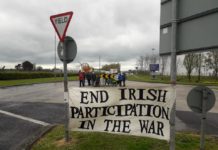After over 40 years of intermittent violence which claimed many lives the Basque guerrilla group ETA renounced armed struggle in favour of political activity earlier this year.
But, as Diarmuid Breatnach outlines, the Spanish establishment has been slow to reciprocate.
ETA declared in January its six months-old official ceasefire to be “general, permanent …and verifiable by the international community.” A consultation process among those who support independence for the Basque areas controlled by the Spanish and French states had been taking place throughout 2010, cumulating in a leading political element rejecting violence in favour of political organisation, debate and civil disobedience.
However, the Spanish government has maintained its policy of repression and complaints of torture by political detainees continue.
The Spanish hard Right media and their principle political party – Partido Popular – call for no negotiation with terrorists, claiming Basque radicals only wish to talk because they are weak and they should be crushed.
The social democratic media and many in the ruling Partido Socialista Obrero Español (POSE), say that previous ceasefires have been broken and the leading pro-independence political movement, Abertzale Left, has to do more to convince them that they are in earnest.
The Abertzale Left itself is a heterogeneous movement. Ranging from Marxist to anarchist it comprises the daily newspaper Gara, the trade union LAB, youth organisations, a political prisoners’ support group and a number of other cultural and political groups. However the movement’s leadership have made clear the new ETA truce is unilateral and the result of a wide consultation that conclusively resulted in a decision to reject violence and to rely on democratic political processes.
Some commentators have pointed out that the line of “ETA only wants to talk because it is weak now, so why bother” is a dangerous one, as the message given is that ETA needs to become strong in order to be considered worth talking to.
Despite the cold response from the Spanish establishment to their political initiative Abertzale Left has began to gather allies. When parties of the Basque separatist radical Left have been allowed to take part in the Spanish electoral process, they have won the votes of up to 25% of the southern (within the Spanish state) Basque electorate – 10% at their lowest point. But since 2003, the year the Spanish state closed down the pro-self determination Basque language newspaper, Egunkaria, and banned the pan-Basque organisation of town mayors and councillors Udalbitza, they have also banned every political party or electoral platform representing the Abertzale Left (with the exception of a Spanish state-wide Iniciativa Independista alliance that contested the 2009 European elections) and arrested its activists.
However Abertzale Left has declared its intention to stand in upcoming local government elections with a new pro independence political party Sortu launched in January. In its constitution Sortu rejected violence “including that of ETA” and undertook to expel from the party any member who advocated it. Parties cannot be registered in the Spanish state unless their constitutions comply with the Political Parties Law and it is clear that the new party wanted to ensure that the State had no excuse to refuse its registration.
Many Basque political and social organisations and all Basque trade unions welcomed Sortu’s formation, while the District Attorney of the Basque Regional Court stated that its constitution was a significant departure from previous political formulations of the Abertzale Left.
But on the basis of a file presented to it by the Guardia Civil, a paramilitary police force, the Spanish state’s Supreme Court stated Sortu was merely a reformation of an earlier pro-independence political party Batasuna and on 24th March declined its registration on a split vote of nine to seven judges. The decision has been appealed to the Constitutional Court but with a late April deadline for registration for the local government elections, even a favourable decision may come too late for the party’s participation.
The banning of Abertzale Left aligned political parties is part of wider state repression including closures of newspapers, radio stations, web-tv and websites, the banning of youth organisations, the arrest, torture and imprisonment of political activists.
Spanish liberal opinion, for the most part, ignores the evidence of this repression in the Basque Country. But some cracks in that unanimity may be appearing. Recently two duty solicitors employed by the state in Madrid to “supervise” the detentions of Basque political activists, broke ranks and refused to endorse “confessions”, commenting on the mental state of the detainees and on the “unusual hours” at which the “confessions” had been obtained (e.g. 4 a.m.). In April 2010, the National Court in Madrid found that the journalists and management of Egunkaria, accused of assisting a terrorist organisation, had no case to answer and that the newspaper should not have been closed. While in January 20 members of Udalbitza, on trial on similar charges, were similarly found not guilty. Its aims might be separatist and people might not like that but that did not did not make its activities illegal, the judges commented. The dissenting verdict of seven judges of the Spanish Supreme Court on the registration of Sortu is another example of cracks in the Spanish consensus, with growing opposition also voiced within the ruling PSOE to the Political Parties Law.
But for Basques to gain a real measure of independence would mean the French and Spanish states being prepared to lose a substantial part of their territory. Such an event would also encourage other sepratitist movements. There is no evidence that either state is seriously prepared to contemplate the prospect. So why then does the Abertzale Left seem to believe that the political process can bring them what they want?
The published conclusions of Abertzale Left’s internal debate show a decision to fight the Spanish state on what they consider to be its weakest front – the political one. They reason that through their leadership of Basque struggles since the creation of the two autonomous regions of the southern Basque Country in 1978, these structures have been exposed as unable to satisfy aspirations for self-determination and the development of an egalitarian society. It is time, they say, to take the next step forward, to mobilise the widest possible social and political forces to present a front for selfdetermination of such amplitude that it cannot be denied. At the same time in France they are campaigning to build a viable administrative, cultural, economic and political unit of the three Basque provinces there, which are currently part of a wider French administrative depárment. It is noticeable how often the Abertzale Left refer to the Irish Peace Process and Sinn Féin has been working quite closely with them.
But there are also doubts within Abertzale Left about the comparison. In private conservation some Abertzale Left activists say: “We are not like the Irish movement – we have a very broad movement right across our nation.” They say that they be concentrating on building the broadest unity at different levels and using campaigns of civil disobedience. Evidently they expect to achieve a result which Sinn Féin has been unable to do.
But there is disquiet among a minority. Sortu renouncing violenceis one thing, but specifically mentioning ETA while making no mention of the violence of the Spanish state is quite another. And the promise to expel anyone who advocates armed struggle has left a bad taste in the mouths of many.
But the consultation process was very wide and there is no sign of a forthcoming split but a future one in the movement cannot be ruled out, including perhaps a “dissident” ETA – especially if the Spanish state does not permit the Abertzale Left to enter the electoral process. On the other hand, many believe that the repressive apparatus of the Spanish state and its reactionary political forces need ETA in order to justify their existence and their repression of Basque legitimate demands for self-determination.
Euskal Herria (“The Land Where the People Speak Basque”) consists of seven provinces, three in Iparralde (“the Northern Country”) within the French state and four in Hegoalde (“the Southern Country”) within the Spanish state.
Part of Euskal Herria was granted autonomy by the Spanish Republican Government in 1936 and many Basques fought for the Republic during the civil war. This conflict saw the bombing by the German Luftwaffe of Gernika (Guernica), the ancient gathering place of the Basque chiefs. During Franco’s rule of a quasi-fascist Spanish state the Basques faced political and cultural repression.
The main Basque political party, Partido Nacionalista Vasco went underground. A section of the party’s youth wing was strongly influenced by the 1960s student uprising and anti-colonial struggles. These Leftist activists endured severe state repression and in 1959 broke away to form ETA (Euskadi Ta Askatuna – Basque Country and Freedom), with a view to “direct action” and also to separate from the Catholic and largely conservative PNV.
Among ETA’s early targets was Franco’s heir Spanish Prime Minister Carrero Blanco killed by a car bomb in 1973. However in later years some of ETA’s actions have met with disapproval within the Abertzale Left and the group’s activities began to be seen as a liability in the struggle for independence. State violence has also been a major obstacle to political dialogue. During the 1980s Basque militants were assassinated by the state-sponsored G.A.L. (Grupos Antiterroristas de Liberación). A journalistic investigation into these activities resulted in jail sentences for – among others — the PSOE Minister of the Interior and senior Guardia Civil officers.
This article was published in LookLeft Vol.2 No.6





